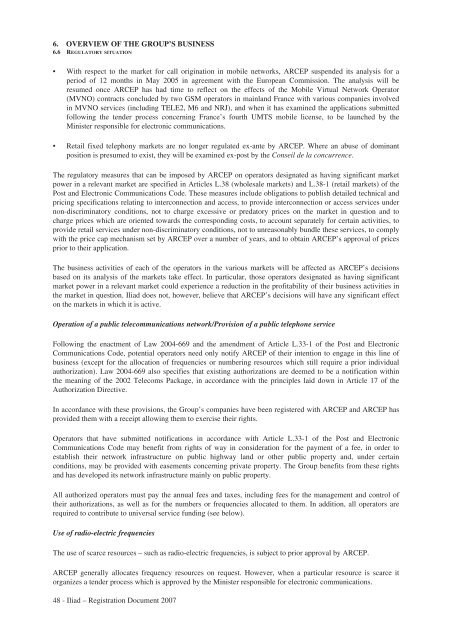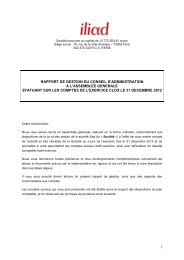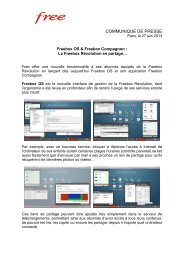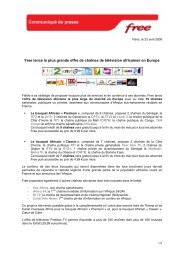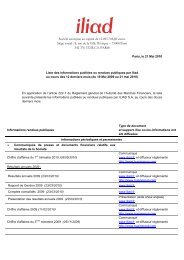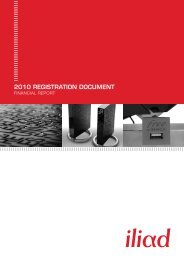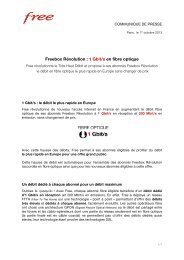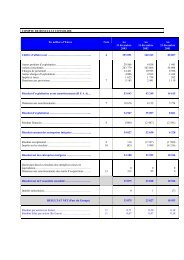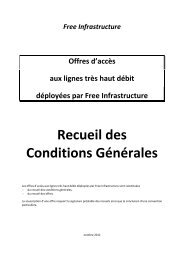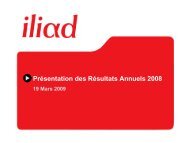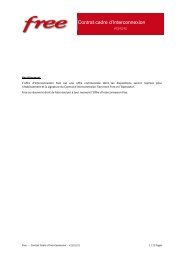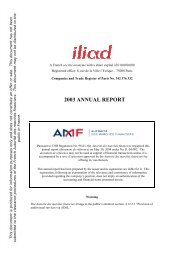REGISTRATION DOCUMENT AND FINANCIAL REPORT - Iliad
REGISTRATION DOCUMENT AND FINANCIAL REPORT - Iliad
REGISTRATION DOCUMENT AND FINANCIAL REPORT - Iliad
- TAGS
- registration
- iliad
- iliad.fr
Create successful ePaper yourself
Turn your PDF publications into a flip-book with our unique Google optimized e-Paper software.
6. OVERVIEW OF THE GROUP’S BUSINESS<br />
6.6 REGULATORY SITUATION<br />
• With respect to the market for call origination in mobile networks, ARCEP suspended its analysis for a<br />
period of 12 months in May 2005 in agreement with the European Commission. The analysis will be<br />
resumed once ARCEP has had time to reflect on the effects of the Mobile Virtual Network Operator<br />
(MVNO) contracts concluded by two GSM operators in mainland France with various companies involved<br />
in MVNO services (including TELE2, M6 and NRJ), and when it has examined the applications submitted<br />
following the tender process concerning France’s fourth UMTS mobile license, to be launched by the<br />
Minister responsible for electronic communications.<br />
• Retail fixed telephony markets are no longer regulated ex-ante by ARCEP. Where an abuse of dominant<br />
position is presumed to exist, they will be examined ex-post by the Conseil de la concurrence.<br />
The regulatory measures that can be imposed by ARCEP on operators designated as having significant market<br />
power in a relevant market are specified in Articles L.38 (wholesale markets) and L.38-1 (retail markets) of the<br />
Post and Electronic Communications Code. These measures include obligations to publish detailed technical and<br />
pricing specifications relating to interconnection and access, to provide interconnection or access services under<br />
non-discriminatory conditions, not to charge excessive or predatory prices on the market in question and to<br />
charge prices which are oriented towards the corresponding costs, to account separately for certain activities, to<br />
provide retail services under non-discriminatory conditions, not to unreasonably bundle these services, to comply<br />
with the price cap mechanism set by ARCEP over a number of years, and to obtain ARCEP’s approval of prices<br />
prior to their application.<br />
The business activities of each of the operators in the various markets will be affected as ARCEP’s decisions<br />
based on its analysis of the markets take effect. In particular, those operators designated as having significant<br />
market power in a relevant market could experience a reduction in the profitability of their business activities in<br />
the market in question. <strong>Iliad</strong> does not, however, believe that ARCEP’s decisions will have any significant effect<br />
on the markets in which it is active.<br />
Operation of a public telecommunications network/Provision of a public telephone service<br />
Following the enactment of Law 2004-669 and the amendment of Article L.33-1 of the Post and Electronic<br />
Communications Code, potential operators need only notify ARCEP of their intention to engage in this line of<br />
business (except for the allocation of frequencies or numbering resources which still require a prior individual<br />
authorization). Law 2004-669 also specifies that existing authorizations are deemed to be a notification within<br />
the meaning of the 2002 Telecoms Package, in accordance with the principles laid down in Article 17 of the<br />
Authorization Directive.<br />
In accordance with these provisions, the Group’s companies have been registered with ARCEP and ARCEP has<br />
provided them with a receipt allowing them to exercise their rights.<br />
Operators that have submitted notifications in accordance with Article L.33-1 of the Post and Electronic<br />
Communications Code may benefit from rights of way in consideration for the payment of a fee, in order to<br />
establish their network infrastructure on public highway land or other public property and, under certain<br />
conditions, may be provided with easements concerning private property. The Group benefits from these rights<br />
and has developed its network infrastructure mainly on public property.<br />
All authorized operators must pay the annual fees and taxes, including fees for the management and control of<br />
their authorizations, as well as for the numbers or frequencies allocated to them. In addition, all operators are<br />
required to contribute to universal service funding (see below).<br />
Use of radio-electric frequencies<br />
The use of scarce resources – such as radio-electric frequencies, is subject to prior approval by ARCEP.<br />
ARCEP generally allocates frequency resources on request. However, when a particular resource is scarce it<br />
organizes a tender process which is approved by the Minister responsible for electronic communications.<br />
48 - <strong>Iliad</strong> – Registration Document 2007


